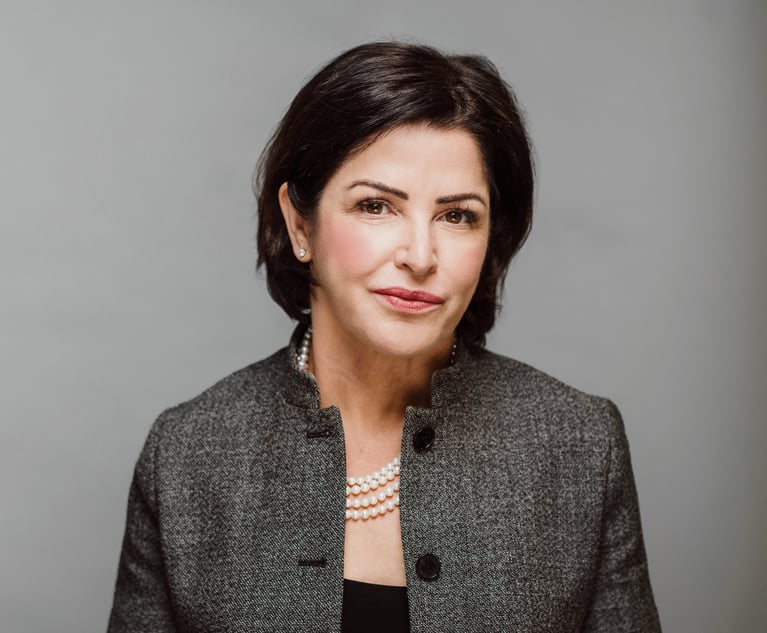What The Rihan v EY Case Tells us About Whistleblowing in Accountancy
The UK case has brought up a number of topics that the professional service industry must reflect upon.
June 05, 2020 at 05:01 AM
4 minute read
 A whistleblower sued EY for $10.8 million.
A whistleblower sued EY for $10.8 million.
The year 2020 may well go down as 'The Year of the Whistleblower'.
The first of the two stand-out cases being that of Dr. Li Webliang, the Wuhan doctor who first issued contact warnings of the Coronavirus. This information could be worth $6 trillion, the calculated price on the global economy according to Bloomberg Economics. The other being auditor Amjad Rihan successfully suing EY for $10.8 million in damages.
A recent judgment, issued on 17th April by the British High Court, against the accounting firm EY, has bolstered criticism that some firms have acted as enablers for financial misconduct. EY was found liable for covering up evidence of money laundering and forcing out a whistleblower.
The case was brought by Amjad Rihan, a former EY partner in Dubai, who exposed evidence of money laundering by gold refiner Kaloti Jewellery International. In 2013, Mr Rihan led an audit that discovered Dubai's biggest gold refiner Kaloti had paid out a total of $5.2 billion in cash in 2012. He argued that it was evidence of money laundering but EY failed to report the activity to the authorities. EY then helped to cover up a crime: the export to Kaloti in Dubai, of gold bars that had been disguised as silver to avoid export limits on gold.
A 2019 BBC Panorama documentary revealed the smuggled gold Mr Rihan uncovered at Kaloti was owned by a criminal gang that laundered money for British drug dealers. The gang had collected cash from drug dealers in the UK and other European countries; they then laundered the dirty money by buying and selling black market gold.
According to Inequality.org, Rihan was removed from an audit on the quality and propriety of Kaloti's business practices when he sought to report the evidence to authorities. This has brought new questions to the accounting and auditing space on the role that whistleblowing has within the sector and how the industry reflects on this landmark case.
According to data obtained by investigations firm Kroll, under the Freedom of Information Act, the total number of whistleblowing tip-offs to the Financial Conduct Authority in 2019 was up 3.5% on the previous year, to reach the highest level recorded since 2015. The biggest increase was in reports about breaches of standards of professional behaviour, which rose by 35%. Whistleblowers were also more prepared to disclose their identity, with only a quarter wishing to remain anonymous; the lowest proportion since 2014.
The EY case has brought up a number of topics that the professional service industry must reflect upon. First and foremost, this is a reminder to all that whistleblowing is a crucial aspect of the sector and all firms must have stringent whistleblowing policies that are in place; accessible to all staff and abided by every echelon of the business. The protection offered to whistleblowers is key and must never be in any doubt.
Despite this, the facts and circumstances in whistleblowing cases are often complex and ambiguous by their very nature and so there must be proper processes to report cases, utilising independent and trusted consultations.
The fact that Mr Justice Kerr openly criticised EY's integrity and ethics in this case, supports the case for unambiguity and honesty within the sector and should be a serious warning to all that strong whistleblowing policies are not only a requirement but set a precedent for open and transparent business.
Chris Biggs is managing director of Theta Financial Reporting
This content has been archived. It is available through our partners, LexisNexis® and Bloomberg Law.
To view this content, please continue to their sites.
Not a Lexis Subscriber?
Subscribe Now
Not a Bloomberg Law Subscriber?
Subscribe Now
NOT FOR REPRINT
© 2025 ALM Global, LLC, All Rights Reserved. Request academic re-use from www.copyright.com. All other uses, submit a request to [email protected]. For more information visit Asset & Logo Licensing.
You Might Like
View All
Pallas Partners Founder On the Disputes Trends to Look Out For in 2025
4 minute read
What to Expect From Teresa Ribera, the EU‘s New Competition Commissioner
6 minute read
Trending Stories
- 1Snapshot Judgement: The Case Against Illustrated Indictments
- 2Texas Supreme Court Grapples Over Fifth Circuit Question on State Usury Law
- 3Exploring the Opportunities and Risks for Generative AI and Corporate Databases: An Introduction
- 4Farella Elevates First Female Firmwide Managing Partners
- 5Family Court 2024 Roundup: Part I
Who Got The Work
J. Brugh Lower of Gibbons has entered an appearance for industrial equipment supplier Devco Corporation in a pending trademark infringement lawsuit. The suit, accusing the defendant of selling knock-off Graco products, was filed Dec. 18 in New Jersey District Court by Rivkin Radler on behalf of Graco Inc. and Graco Minnesota. The case, assigned to U.S. District Judge Zahid N. Quraishi, is 3:24-cv-11294, Graco Inc. et al v. Devco Corporation.
Who Got The Work
Rebecca Maller-Stein and Kent A. Yalowitz of Arnold & Porter Kaye Scholer have entered their appearances for Hanaco Venture Capital and its executives, Lior Prosor and David Frankel, in a pending securities lawsuit. The action, filed on Dec. 24 in New York Southern District Court by Zell, Aron & Co. on behalf of Goldeneye Advisors, accuses the defendants of negligently and fraudulently managing the plaintiff's $1 million investment. The case, assigned to U.S. District Judge Vernon S. Broderick, is 1:24-cv-09918, Goldeneye Advisors, LLC v. Hanaco Venture Capital, Ltd. et al.
Who Got The Work
Attorneys from A&O Shearman has stepped in as defense counsel for Toronto-Dominion Bank and other defendants in a pending securities class action. The suit, filed Dec. 11 in New York Southern District Court by Bleichmar Fonti & Auld, accuses the defendants of concealing the bank's 'pervasive' deficiencies in regards to its compliance with the Bank Secrecy Act and the quality of its anti-money laundering controls. The case, assigned to U.S. District Judge Arun Subramanian, is 1:24-cv-09445, Gonzalez v. The Toronto-Dominion Bank et al.
Who Got The Work
Crown Castle International, a Pennsylvania company providing shared communications infrastructure, has turned to Luke D. Wolf of Gordon Rees Scully Mansukhani to fend off a pending breach-of-contract lawsuit. The court action, filed Nov. 25 in Michigan Eastern District Court by Hooper Hathaway PC on behalf of The Town Residences LLC, accuses Crown Castle of failing to transfer approximately $30,000 in utility payments from T-Mobile in breach of a roof-top lease and assignment agreement. The case, assigned to U.S. District Judge Susan K. Declercq, is 2:24-cv-13131, The Town Residences LLC v. T-Mobile US, Inc. et al.
Who Got The Work
Wilfred P. Coronato and Daniel M. Schwartz of McCarter & English have stepped in as defense counsel to Electrolux Home Products Inc. in a pending product liability lawsuit. The court action, filed Nov. 26 in New York Eastern District Court by Poulos Lopiccolo PC and Nagel Rice LLP on behalf of David Stern, alleges that the defendant's refrigerators’ drawers and shelving repeatedly break and fall apart within months after purchase. The case, assigned to U.S. District Judge Joan M. Azrack, is 2:24-cv-08204, Stern v. Electrolux Home Products, Inc.
Featured Firms
Law Offices of Gary Martin Hays & Associates, P.C.
(470) 294-1674
Law Offices of Mark E. Salomone
(857) 444-6468
Smith & Hassler
(713) 739-1250









